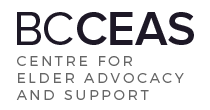Blog
- Details
As we enter Financial Literacy Month (FLM) 2016, I want to draw attention to a topic I believe warrants closer attention in Canada’s financial literacy strategy. Financial literacy strategies in Canada currently pursue three specific goals in order to improve the financial literacy and financial health of Canadians of all ages. This strategy includes a focus on teaching Canadians to 1) manage debt wisely; 2) save for the future and, 3) understand their rights and responsibilities. I certainly strongly support the current focus on improving financial health using these steps. However, recent research is increasingly suggesting that a lack of financial literacy doesn’t just have consequences for our financial health. A lack of financial literacy can also have serious consequences for our emotional, psychological, and functional/physical health in a number of ways, particularly with respect to the health consequences associated with financial mistreatment and abuse. While people of all ages can experience financial mistreatment and fraud, and the resulting negative health outcomes, the research suggests the health consequences are particularly damaging for older adults.
- Details
By Rochella Vassell
The Elder Abuse Ontario Central West Conference took place on September 23, 2016. It welcomed 100 attendees and featured an excellent line-up of speakers.
- Linda Elliott, Crown Attorney, Ministry of the Attorney General (MAG)
- Joslyn Gaston, Mental Health Court Coordinator, Canadian Mental Health Association (CMHA)
- John Hunt, Guelph Police Service
- Birgit Niggebaum Pervis, Guelph Wellington Women in Crisis
- Liz Kent, Executive Director, Victim Services of Guelph
- Penny Leach, Manager, Wellington-Dufferin County Victim Witness Assistance Program
- Taren Hardacre, Seniors at Risk Coordinator, CMHA
- Jane McKinnon, Manager, Specialized Geriatric Services, CMHA
- Farial Ali, Coordinator, Safe Bed Program Peel
- Sian Lockwood, Systems Coordinator, Alzheimer Society, Waterloo-Wellington
- Andrea Ninacs, Staff Sergeant, Guelph Police Service
- Jodi Napper-Campbell, Administrator with the Avalon care Centre
Featured Topics:
- Details
By Rasha Ashraf, Newcomer Women's Services
Newcomer Women’s Services is a nonprofit organization that provides services to recently arrived immigrant women, in areas such as employment, settlement, English language development and others. Our service population is diverse, which means our students reflect a myriad of cultures and ages. We have a substantial senior population and it is important for us to advocate the challenges that they face in life, especially in a new country.
Elders are vital members of our society, as they are an anchor from which the younger generation can learn and grow. Their experiences hold a wealth of information and they are a direct connection to our culture and heritage. But we often lose sight of their value and subjugate them to a life of neglect and loneliness.
Too often when we speak of issues such as neglect and abuse, we take on a passive role and simply say “that’s awful” or “it is so unfortunate”. The most common response is to graze over the issue, never fully internalizing the reality of the problem. This video does not just highlight the issue but it puts real faces to it. These are real people. The visual aspect creates a powerful connection to these elders and helps us take their message to heart. There were, of course, challenges in making this video. From project management to transcending language barriers and helping our participants understand the concept of the video and get comfortable in front of the camera. However, the success of this video is evident on their faces, as we highlight what our seniors want to see and receive from the wider community. Featuring younger members in the video also reiterates our message: to change our perception of elders and to really make a difference, we need the support of our youngest generations. We have had an amazing response online as our video has close to 2,000 views on YouTube.
Our video seeks to raise awareness in the community and beyond by starting a vital conversation about the lives of our seniors. Join us today, so that together, we can stand up for elder rights and make it a just world for all seniors.
Related resource: Check out Newcomer Women's Services' Promising Project: Under the Mango Tree
- Details
CNPEA would like to thanks its members for attending the Network’s 2016 AGM and voting in a new slate of officers. Congratulations to our newly elected members: Sherry Baker, Leah Cohen, Susan Crichton,Andrew Elinesky, Jennifer Gurke, Kelly Heisz, Barb Hood, Kathy Majowski, Sharon McKenzie, Par Power, Raeann Rideout and Jocelyn Yerxa. (To know more about our Board members, check out Who We Are)
CNPEA would also like to thank its outgoing Board members - Olive Bryanton, Elliot PausJenssen, Elizabeth Podnieks, and Terry Rideout - for their tireless commitment to supporting the Network's growth and development as a national organization.
The CNPEA Board of Directors would particularly like to recognize Dr.Elizabeth Podnieks, who is stepping down from the Board this year, after 18 years of dedication and leadership to the Canadian Network for the Prevention of Elder Abuse. In recognition of Elizabeth’s outstanding work for CNPEA and the fight against elder abuse, the Board of directors has elected Elizabeth Podnieks as Honorary Board Member of the Network.
- Details
The BC centre for Elder Advocacy and Support just launched a new series of workshop to assist older adults (50 years old and up) who are new to Canada and living in Metro Vancouver.
These workshops are meant to help older adults
- Meet regularly with other older adults in a safe and supportive environment
- Learn about community resources
- Increase awareness around issues of mistreatment of older adults
- Empower themselves and others
(from http://bcceas.ca/)
Page 39 of 55




















